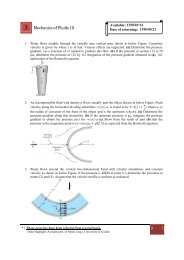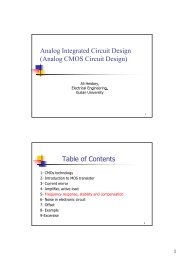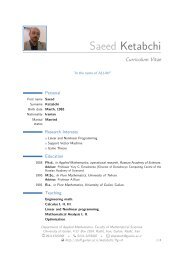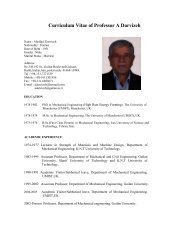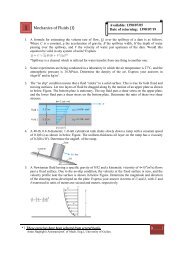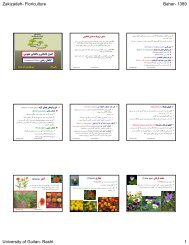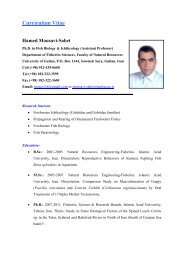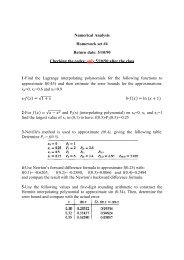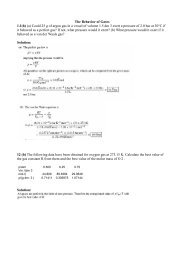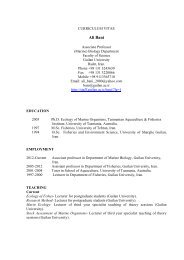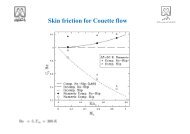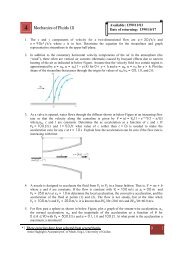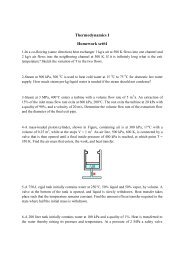Medical Tourism in Developing Countries
Medical Tourism in Developing Countries
Medical Tourism in Developing Countries
- No tags were found...
Create successful ePaper yourself
Turn your PDF publications into a flip-book with our unique Google optimized e-Paper software.
22 ● <strong>Medical</strong> <strong>Tourism</strong> <strong>in</strong> Develop<strong>in</strong>g <strong>Countries</strong>account of the balance of payments and generat<strong>in</strong>g successive rounds ofeconomic activity; leaders are therefore quick to offer their natural resources.As Cynthia Enloe noted, countries are <strong>in</strong>creas<strong>in</strong>gly putt<strong>in</strong>g all their developmenteggs <strong>in</strong> the tourist basket. 8Add<strong>in</strong>g medic<strong>in</strong>e for foreigners to the mix further expands the economicopportunities of develop<strong>in</strong>g countries. Worldwide, health services are estimatedto be worth some $3 trillion, 9 and the health-care sector is amongthe highest growth sectors <strong>in</strong> the mid-2000s. 10 Trade <strong>in</strong> medical services isa small but grow<strong>in</strong>g component of overall medical care. As a result, medicaltourism has been described as hav<strong>in</strong>g endless opportunities and benefits fordevelop<strong>in</strong>g countries that manage to break <strong>in</strong>to the market.To the extent that tourism is a panacea for dest<strong>in</strong>ation LDCs, thenmedical tourism is a medium through which the transfer of wealth occursbetween the more developed and the less developed countries, and it propelscountries along a growth trajectory. One crucial consideration thatprevents medical tourism from be<strong>in</strong>g a panacea is the fact that, like tourism<strong>in</strong> general, it depends on foreign consumer demand. Indeed, the entiremedical tourism sector is based on exogenous factors over which neither theprivate nor the public sectors have any control. Other than economic <strong>in</strong>centives,market<strong>in</strong>g efforts, and perhaps currency devaluations, little can bedone to <strong>in</strong>crease foreign demand. Such powerlessness cannot but br<strong>in</strong>g tom<strong>in</strong>d past historical periods when countries of Asia, Africa, and Lat<strong>in</strong>America were economically dependent on Western capitalist states. Dur<strong>in</strong>gcolonialism, and often no less dur<strong>in</strong>g the post-colonial period, develop<strong>in</strong>gcountries were tied to Western economies <strong>in</strong> a complex system of <strong>in</strong>ternationalexchange based on deteriorat<strong>in</strong>g terms of trade. These one-waydependency relationships were the focus of the Dependency Theories of the1970s. In this chapter, it is argued that medical tourism does not fostersuch dependency. Indeed, depend<strong>in</strong>g on the export earn<strong>in</strong>gs of a cash cropsuch as peanuts is very different from attract<strong>in</strong>g consumers to high-techservices that are unavailable or <strong>in</strong>accessible <strong>in</strong> their home countries. In thisway, medical tourism stands apart from tourism <strong>in</strong> general, and so, it hasunique implications for economic development.<strong>Medical</strong> <strong>Tourism</strong> Takes Off: The InternationalEnvironment as EnablerWith the conclusion of the Cold War and its bipolar division of countries,scholars rushed to describe the <strong>in</strong>ternational environment that followed itsdemise. Despite the <strong>in</strong>itial buzz created by Fukuyama’s idea that history died,and with it, the divisions among countries, others disagreed and identified



